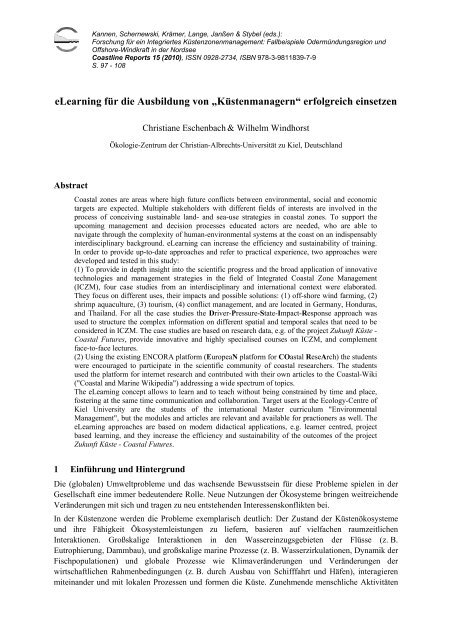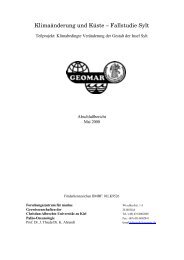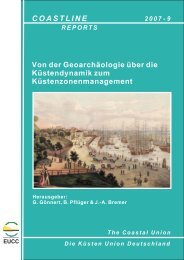COASTLINE - Büro für Umwelt und Küste
COASTLINE - Büro für Umwelt und Küste
COASTLINE - Büro für Umwelt und Küste
Sie wollen auch ein ePaper? Erhöhen Sie die Reichweite Ihrer Titel.
YUMPU macht aus Druck-PDFs automatisch weboptimierte ePaper, die Google liebt.
Kannen, Schernewski, Krämer, Lange, Janßen & Stybel (eds.):<br />
Forschung für ein Integriertes Küstenzonenmanagement: Fallbeispiele Odermündungsregion <strong>und</strong><br />
Offshore-Windkraft in der Nordsee<br />
Coastline Reports 15 (2010), ISSN 0928-2734, ISBN 978-3-9811839-7-9<br />
S. 97 - 108<br />
eLearning für die Ausbildung von „Küstenmanagern“ erfolgreich einsetzen<br />
Christiane Eschenbach & Wilhelm Windhorst<br />
Ökologie-Zentrum der Christian-Albrechts-Universität zu Kiel, Deutschland<br />
Abstract<br />
Coastal zones are areas where high future conflicts between environmental, social and economic<br />
targets are expected. Multiple stakeholders with different fields of interests are involved in the<br />
process of conceiving sustainable land- and sea-use strategies in coastal zones. To support the<br />
upcoming management and decision processes educated actors are needed, who are able to<br />
navigate through the complexity of human-environmental systems at the coast on an indispensably<br />
interdisciplinary backgro<strong>und</strong>. eLearning can increase the efficiency and sustainability of training.<br />
In order to provide up-to-date approaches and refer to practical experience, two approaches were<br />
developed and tested in this study:<br />
(1) To provide in depth insight into the scientific progress and the broad application of innovative<br />
technologies and management strategies in the field of Integrated Coastal Zone Management<br />
(ICZM), four case studies from an interdisciplinary and international context were elaborated.<br />
They focus on different uses, their impacts and possible solutions: (1) off-shore wind farming, (2)<br />
shrimp aquaculture, (3) tourism, (4) conflict management, and are located in Germany, Honduras,<br />
and Thailand. For all the case studies the Driver-Pressure-State-Impact-Response approach was<br />
used to structure the complex information on different spatial and temporal scales that need to be<br />
considered in ICZM. The case studies are based on research data, e.g. of the project Zukunft Küste -<br />
Coastal Futures, provide innovative and highly specialised courses on ICZM, and complement<br />
face-to-face lectures.<br />
(2) Using the existing ENCORA platform (EuropeaN platform for COastal ReseArch) the students<br />
were encouraged to participate in the scientific community of coastal researchers. The students<br />
used the platform for internet research and contributed with their own articles to the Coastal-Wiki<br />
("Coastal and Marine Wikipedia") addressing a wide spectrum of topics.<br />
The eLearning concept allows to learn and to teach without being constrained by time and place,<br />
fostering at the same time communication and collaboration. Target users at the Ecology-Centre of<br />
Kiel University are the students of the international Master curriculum "Environmental<br />
Management", but the modules and articles are relevant and available for practioners as well. The<br />
eLearning approaches are based on modern didactical applications, e.g. learner centred, project<br />
based learning, and they increase the efficiency and sustainability of the outcomes of the project<br />
Zukunft Küste - Coastal Futures.<br />
1 Einführung <strong>und</strong> Hintergr<strong>und</strong><br />
Die (globalen) <strong>Umwelt</strong>probleme <strong>und</strong> das wachsende Bewusstsein für diese Probleme spielen in der<br />
Gesellschaft eine immer bedeutendere Rolle. Neue Nutzungen der Ökosysteme bringen weitreichende<br />
Veränderungen mit sich <strong>und</strong> tragen zu neu entstehenden Interessenskonflikten bei.<br />
In der Küstenzone werden die Probleme exemplarisch deutlich: Der Zustand der Küstenökosysteme<br />
<strong>und</strong> ihre Fähigkeit Ökosystemleistungen zu liefern, basieren auf vielfachen raumzeitlichen<br />
Interaktionen. Großskalige Interaktionen in den Wassereinzugsgebieten der Flüsse (z. B.<br />
Eutrophierung, Dammbau), <strong>und</strong> großskalige marine Prozesse (z. B. Wasserzirkulationen, Dynamik der<br />
Fischpopulationen) <strong>und</strong> globale Prozesse wie Klimaveränderungen <strong>und</strong> Veränderungen der<br />
wirtschaftlichen Rahmenbedingungen (z. B. durch Ausbau von Schifffahrt <strong>und</strong> Häfen), interagieren<br />
miteinander <strong>und</strong> mit lokalen Prozessen <strong>und</strong> formen die Küste. Zunehmende menschliche Aktivitäten




